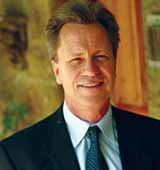|
Executive Interviews: Interview with John A Davis on Family Businesses
May 2007
-
By Dr. Nagendra V Chowdary
 John A Davis
John A Davis Senior Lecturer of Business Administration at Harvard Business School, the Faculty chair for Harvard Business School`s Executive Education Program 
Congratulations professor for having
accomplished phenomenal work
on managing family businesses. Your
research's impact is seen in most of
the literature on managing family
businesses (by way of citations, references
etc.). What was that powerful
trigger that has prompted you to embark
on this research?
As a graduate student at Harvard Business
School, between 1977 and 1982, I
was interested in organizational behavior
and in the psychology of families.
Harvard Professor Renato
Tagiuri who became and remains
my mentor considered my interests
and recommended that I study family
business.
|
|
Tagiuri's recommendation
seems obvious today but thirty years
ago there wasn't much work on the
topic of family business and it certainly
wasn't a field of study yet.
Tagiuri offered to supervise my work
and he involved me in the teaching
and research he was doing at HBS
with owner-presidents of private companies.
Over the next five years he and
I pioneered some of the conceptual
foundations of the family business
field.
-
Can you share with us about your
initial research journey? How could
you get insights into managing family
businesses? Was there any difficulty
in breaking ice with family-run businesses,
for, disclosure and divulgence
must have been exceptions rather
than imperatives.
I have learned of many research opportunities
through my students and
clients, so identifying research opportunities
and gaining access has
been relatively easy. When you research
a family business, and especially
when you write a case on a
family business, families and family
companies are by their nature private;
so, the families often want to
disguise their situation so that the
family and business identity aren't
known. With the assurance of privacy,
families are generally willing to
have you study their issues and practices.
But the desire for privacy can
be very strong. I have had two cases
that I labored over for months finally
rejected by the family because they
were uncomfortable with its content—
even though these cases were
highly disguised. -
There are so many definitions of a
family business. What, according to
you, is a family business? What are the
different typologies of the family business?
A family business is one where a
single family controls its ownership
and where two or more family members
significantly influence its direction
through their management roles,
ownership rights or family ties.
Tagiuri and I introduced this definition
in the late 1970s. Many other definitions
persist but I believe that these
other definitions are either too inclusive
or too restrictive. -
How is a family business system
different from a joint-stock-company
business system?
A joint stock company (as far as I understand
it in India) can be a family
business or not. These are different
types of categories. -
You talk of a three-circle model of
family business system (indicating
system roles and relationships). What
is this model all about?
The Three-Circle Model, developed
by Professor Tagiuri and myself in the
late 1970s, identifies three overlapping
groups of people employees,
owners and family members—that inhabit
the family business system. This
critical but by now obvious framework
has become the central paradigm
of the field. It keeps our attention
on the three important groups in the
family business system, reminds us
that the three groups need to be
aligned, and also identifies the seven
sub-groups (like family owner employee)
that influence the family business. -
What are the different phases of
family business system's development
across generations?
The stages of development of a family
business system are described in
my book, Generation to Generation.
For example, there are three basic
ownership stages of a family business:
controlling owner, sibling partnership
and cousin consortium.
Each of these stages describes a different
configuration of family owners
of the business. There are accompanying
stages of development for
the family and business. The important
lessons of this developmental
framework are that the family business
system changes in rather predictable
ways, and family business
system leaders can and should anticipate
these changes and prepare
for them.
1.
Family Owned Business Case Study
2. ICMR
Case Collection
3.
Case Study Volumes
|
